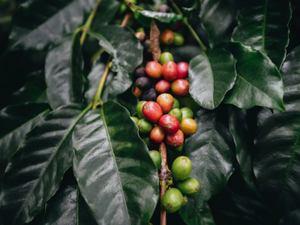Cleaning up the coffee value chain
In this deep dive, New Hope Network’s reporter examines whether ‘Big Coffee’s’ sustainability commitments are doing enough for this challenged industry.
April 28, 2023

Coffee is one of the most consumed beverages on the planet, and its popularity is only growing. According to the International Institute for Sustainable Development (IISD), coffee’s global market value hit a whopping $102 billion in 2020, and sales have kept climbing ever since. Analysts project a 4.3% compound annual growth rate between 2021 and 2026.
As consumer demand for coffee increases, production is expanding to keep pace. The United Nations’ Food and Agriculture Organization reports that global coffee output swelled from roughly 8.5 million tons in 2008 to 10.7 million tons in 2020.
While the lion’s share of coffee revenues is reaped by a handful of multinational companies, coffee production is spread out across some 12.5 million farms—and an estimated 125 million workers—worldwide. According to the Coffee Barometer, a collective of sustainability-focused organizations, a staggering 95% of these operations measure 5 hectares or less. However, collectively, smallholder farms grow 73% of the world’s coffee supply.
Although burgeoning demand, production and employment opportunities are generally good news for an industry, these datapoints don’t tell the whole story. The coffee business has long been rife with deep-seeded social and economic inequities, along with sustainability issues, that cast a cloud over its present reality and its future.
The trouble with coffee
First off, coffee may be big business, but growers often earn very little, sometimes barely enough to scrape by. And because coffee is a commodity, its prices fluctuate, meaning producers’ profits can dissipate very quickly. Arabica’s value, for example, has dropped 35% since August 2022. Similar price declines have left many farms operating at a loss in recent years, threatening future coffee production in origin countries such as Kenya, El Salvador and Mexico.
Beyond poor earning potential, coffee farmers can be vulnerable to wage theft. Worse, there have been documentations of slave labor at coffee-growing operations. Child labor is also quite common.
And then there is the environmental quagmire. Because the planet is warming perilously, the very ecosystems in which coffee is grown—as well as the livelihoods of the people who grow it—are under threat.
Already, farmers are facing more frequent extreme weather events than ever before, from floods to droughts to uncharacteristic frost. Any of these crises can decimate coffee yields in a flash, sabotaging growers’ incomes. Climate change is also begetting new molds, funguses, viruses and pests that plague coffee crops while intensifying the impact of existing ones.
As a result of climate-related shifts, certain coffee-producing regions are expected to no longer be viable in the very near future. For instance, IISD projects that by 2050, the climate and soil conditions deemed highly suitable for growing Arabica will have decreased by 50%.
Brewing up solutions
The social, economic or e nvironmental problems plaguing the coffee industry are not new revelations. Certain stakeholders, from NGOs to industry players, have been working hard to rectify them for years, even decades, and they definitely deserve credit for their efforts and impacts.
nvironmental problems plaguing the coffee industry are not new revelations. Certain stakeholders, from NGOs to industry players, have been working hard to rectify them for years, even decades, and they definitely deserve credit for their efforts and impacts.
For example, many mission-based coffee companies have been committed to ecological sustainability and social justice since their inception. Such brands practice fair trade sourcing, ensure farmers are paid living wages, invest in coffee-growing communities and help farms implement regenerative agricultural practices.
Lately, the issues besieging the coffee value chain have received even more attention. The COVID-19 pandemic, with its myriad disruptions, shined a brighter light on these challenges, prompting even more parties to demand change and implement solutions.
As a result, coffee-loving consumers are increasingly voting with their dollars. Natural products retailers are cementing their commitments to selling only responsibly sourced coffee products that have the documentation to prove it. More coffee roasters, foodservice operators and food and beverage brands are following similar criteria when selecting coffee beans or coffee-derived ingredients.
Big companies, big commitments
But each small stakeholder can only do so much. Arguably, the top 10 coffee companies in the world have the money, scale, resources and power to do significantly more. Coffee giants such as Nestlé, Starbucks, Peet’s Coffee, Lavazza Group and J.M. Smucker can, both individually and collectively, wield their huge influence to be a massive force for good.
Many big coffee companies are already making commitments to this effect. Whether driven by their own sense of responsibility or pressured by vendors and consumers, some have been setting goals to improve social and environmental impact for several years now.
Nestlé, for instance, launched its comprehensive Nescafé Plan back in 2010. As part of the global sustainability initiative, the company committed to more responsible sourcing for its Nescafé brand, which counts for one in every seven cups of coffee consumed worldwide. The plan also involved slashing water usage, reducing greenhouse gas emissions, preventing deforestation and training farmers on more sustainable practices. Then in 2021, Nestlé published an 85-page report on its progress over 10 years.
Similarly, the Lavazza Group launched the Lavazza Foundation in 2004 to improve social, economic and environmental sustainability, and began publishing its annual Sustainability Report in 2015. Starbucks too is several years deep into sustainability commitments, sharing its Global Environmental & Social Impact Report each year.
Nestlé has continued to strengthen its pledges. In January 2021, the company announced it would more than double its sustainability spending for the Nescafé brand. It promised to invest $700 million Swiss francs over the next decade to ensure that all Nescafé coffee is responsibly sourced and traceable down to the farmer level by 2025. This would involve paying higher premiums to producers of sustainable beans and stepping up its monitoring of environmental standards, including through third-party audits.
Nestlé made an even bigger splash in October 2022 with the launch of its Nescafé Plan 2030, pledging 1 billion Swiss francs to help growers transition to regenerative agriculture. Nescafé is shooting for 100% responsibly sourced coffee by 2025, and it hopes to have 25% of its coffee grown via regenerative methods by 2050 and 50% grown regeneratively by 2030.
Big companies, big impacts?
 Without question, there have been some major sustainability strides by major coffee players. Many applaud the corporations’ embrace of regenerative agriculture, acknowledging that multinationals’ participation is needed to scale up these farming practices and make real progress against climate change.
Without question, there have been some major sustainability strides by major coffee players. Many applaud the corporations’ embrace of regenerative agriculture, acknowledging that multinationals’ participation is needed to scale up these farming practices and make real progress against climate change.
To some extent, large coffee corporations’ efforts toward social and economic justice have drawn accolades as well. After all, the more companies that reject slave and child labor, ensure fair wages for farmers and uplift coffee-growing communities, the better off our world will be.
Even so, there is still ample concern—and in some cases proof—that Big Coffee’s good intentions don’t always turn into tangible impact. Many stakeholders fear that these corporations are essentially greenwashing their regenerative agriculture efforts, especially since methods of measuring its climate-positive effects are not exactly standardized.
Similarly, the social and economic impacts claimed by big companies may not be as rosy as portrayed. For instance, Starbucks and Nestlé’s Nespresso have both caught fire for sourcing from farms that employ child labor, have documented wage theft or reported worker abuses—all within the last few years.
Inspiring further concern, the 2020 Coffee Barometer report, published in January 2021, acknowledged that while the leading coffee companies had made big sustainability commitments for 2020, most had failed to show evidence of meaningful change in farmer wages, labor standards or climate change mitigation.
According to the research, some corporations, namely Nestlé, rated much higher than their counterparts across multiple metrics, reflecting some tangible impacts. Yet regarding the most pressing environmental and social challenges identified in the UN’s Sustainable Development Goals, a press release from the coalition stated: While some companies have comprehensive policies in place, many large traders and roasters mentioned in the report remain unclear about their commitments, any progress on promises, and lack a comprehensive sustainability strategy with measurable targets over time. No one is doing enough.
Certification integrity
Ideally, the best way to ensure corporate accountability is through third-party audits and certifications. However, as prominent certification programs gain popularity—and more industry money gets involved—they often risk losing legitimacy.
Take Fair Trade Certified or USDA Organic, for example. Both have received serious backlash over what some believe are diluted standards, relaxed to allow high-dollar corporations into the fold. More recently, the integrity of the Certified B Corporation seal has been called into question—ironically, in direct response to a large coffee company’s acceptance into the program.
In April 2022, Nestlé’s Nespresso announced its global certification as a B Corp. Administrator B Lab awards this designation to businesses that, along with making a legal commitment and exhibiting transparency, score at least 80 out of 200 in the rigorous B Impact Assessment, thereby demonstrating high social and environmental performance. Nespresso scored 84.
The brand’s reception of B Corp status drew ire across the B Corp community. Last June, more than 30 Certified B Corps—including, notably, about a dozen coffee companies��—with the support of certification watchdog Fair World Project, penned an open letter expressing their concerns. The coalition contends that, due to about Nespresso’s admission into the club, “the very mission of B Lab and the integrity and relevance of B Corp Certification is at risk.” The letter further stated:
Although Nespresso has achieved the minimum currently required for certification, scoring 84 out of 200 points, Nespresso’s abysmal track record on human rights from child labor and wage theft to abuse of factory workers is well documented by the media and NGOs. Indeed, Nespresso’s extractive business model is publicly known to be fundamentally at odds with the ethical and just future B Corps want to build and should have structurally been a barrier to Nespresso’s B Corp Certification.
Ouch.
Progress, not perfection
To Nestlé’s credit, the company doesn’t ignore criticism, nor shy away from admitting it can do better. Its January 2021 announcement to commit $700 million Swiss francs to responsible sourcing came about a week after the Coffee Barometer was published. Whether the report inspired the new Nescafé investment or this was purely coincidental timing is unknown.
Nestlé has also addressed child labor allegations publicly. And it discusses this and other human rights issues in its extensive progress report on the Nescafé Plan. The document said, "Nine farms within or related to our supply chain were identified as having child-labor risks at the time of CPS’ assessments. As a result, five farms were removed from our value chain, while corrective actions were undertaken at the remaining four locations."
Undoubtedly, Nestlé isn’t the only global coffee company continually aiming to improve its sustainability and justice initiatives. Whether the coffee giants are taking action in response to disparagement or they just want to do the right thing, it arguably doesn’t matter—so long as it results in more dollars devoted to and greater efforts put into transforming the coffee value chain.
Of course, coffee companies must actually demonstrate progress: deliver on their promises to improve social, economic and environmental impacts.
About the Author
You May Also Like



